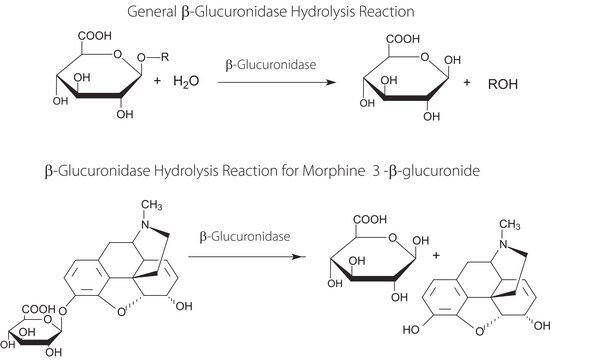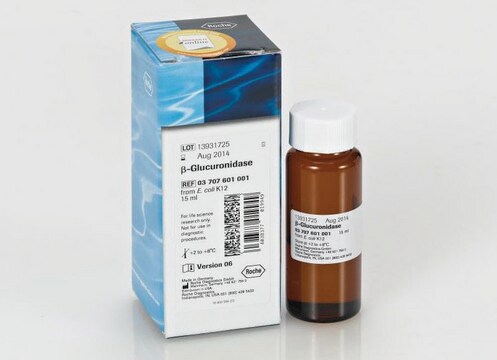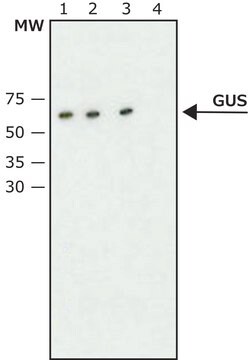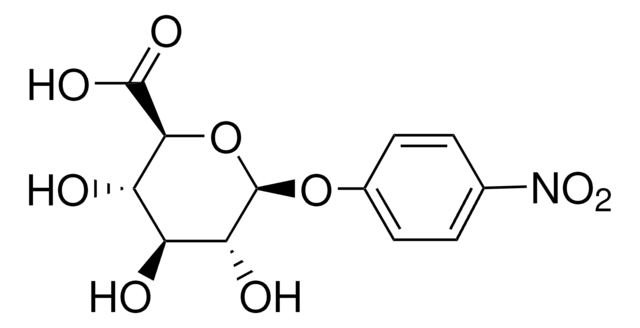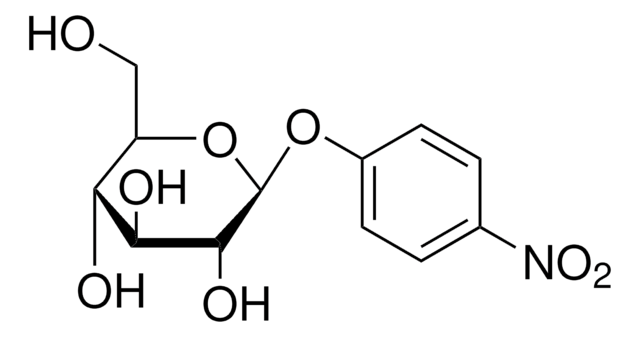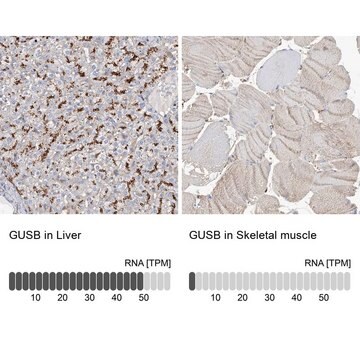G5420
Anti-β-Glucuronidase (N-Terminal) antibody produced in rabbit
~1.5 mg/mL, affinity isolated antibody, buffered aqueous solution
Sinônimo(s):
Anti-GUS
Faça loginpara ver os preços organizacionais e de contrato
About This Item
Produtos recomendados
fonte biológica
rabbit
Nível de qualidade
conjugado
unconjugated
forma do anticorpo
affinity isolated antibody
tipo de produto de anticorpo
primary antibodies
clone
polyclonal
Formulário
buffered aqueous solution
peso molecular
antigen 60 kDa
reatividade de espécies
plant
concentração
~1.5 mg/mL
técnica(s)
western blot: 0.5-1 μg/mL using GUS purified from E. coli
Condições de expedição
dry ice
temperatura de armazenamento
−20°C
modificação pós-traducional do alvo
unmodified
Descrição geral
β-Glucuronidase (GUS) is encoded by the E. coli gus gene (also referred to as uidA), GUS protein (60 kDa) is an hydrolase.
Especificidade
Anti-β-Glucuronidase (N-Terminal) recognizes bacterial GUS expressed in transgenic tobacco plants.
Imunogênio
Sythetic peptide corresponding to amino acids located at the N-terminus of E. coli GUS, conjugated to KLH.
Aplicação
Anti-β-Glucuronidase (N-Terminal) antibody produced in rabbit has been used in western blotting.
Rabbit polyclonal anti-β-Glucuronidase (N-Terminal) antibody may be used for the detection of GUS by immunoblotting (60 kDa). It may be used to detect the reporter GUS marker protein in transgenic plants.
Ações bioquímicas/fisiológicas
β-Glucuronidase (GUS) is a screenable markers E. coli GUS has been extensively used to monitor transgene delivery to plant tissue.
β-Glucuronidase catalyzes the cleavage of terminal glucuronic acid bound by β-linkage from mono-, oligo-, or polysaccharides or phenols. GUS is mainly used as a marker during transgenic events. In vitro GUS activity assays predominantly facilitates histochemical and fluorometric localization in tissues. GUS activity is also used for the analysis of expression of foreign genes. GUS reporter genes fused with specific promoter genes have been used for the determination of transformed tissues on culture media containing antibiotics. GUS-specific antibodies are helpful in detecting GUS gene product in transformed plants.
forma física
Solution in 0.01 M phosphate buffered saline, pH 7.4, containing 15 mM sodium azide.
Armazenamento e estabilidade
For continuous use, store at 2-8 °C for up to one month. For extended storage, freeze in working aliquots. Repeated freezing and thawing, or storage in “frostfree” freezers, is not recommended. If slight turbidity occurs upon prolonged storage, clarify the solution by centrifugation before use. Working dilutions should be discarded if not used within 12 hours.
Exoneração de responsabilidade
Unless otherwise stated in our catalog or other company documentation accompanying the product(s), our products are intended for research use only and are not to be used for any other purpose, which includes but is not limited to, unauthorized commercial uses, in vitro diagnostic uses, ex vivo or in vivo therapeutic uses or any type of consumption or application to humans or animals.
Não está encontrando o produto certo?
Experimente o nosso Ferramenta de seleção de produtos.
produto relacionado
Código de classe de armazenamento
10 - Combustible liquids
Classe de risco de água (WGK)
WGK 3
Ponto de fulgor (°F)
Not applicable
Ponto de fulgor (°C)
Not applicable
Escolha uma das versões mais recentes:
Já possui este produto?
Encontre a documentação dos produtos que você adquiriu recentemente na biblioteca de documentos.
Bacterial glucuronidase as general marker for oncolytic virotherapy or other biological therapies
Hess M, et al.
Journal of Translational Medicine, 9(1), 172-172 (2011)
Michael Hess et al.
Journal of translational medicine, 9, 172-172 (2011-10-13)
Oncolytic viral tumor therapy is an emerging field in the fight against cancer with rising numbers of clinical trials and the first clinically approved product (Adenovirus for the treatment of Head and Neck Cancer in China) in this field. Yet
Release of the recombinant proteins, human serum albumin, ?-glucuronidase, glycoprotein B from human cytomegalovirus, and green fluorescent protein, in root exudates from transgenic tobacco and their effects on microbes and enzymatic activities in soil
Sabharwal N, et al.
Plant Physiology and Biochemistry, 45(6-7), 464-469 (2007)
Vascular-specific expression of GUS and GFP reporter genes in transgenic grapevine (Vitis vinifera L. cv. Albarin
Gago J, et al.
Plant Physiology and Biochemistry, 49(4), 413-419 (2011)
Impact of ubiquitous inhibitors on the GUS gene reporter system: evidence from the model plants Arabidopsis, tobacco and rice and correction methods for quantitative assays of transgenic and endogenous GUS
Fior S, et al.
Plant methods, 5(1), 19-19 (2009)
Nossa equipe de cientistas tem experiência em todas as áreas de pesquisa, incluindo Life Sciences, ciência de materiais, síntese química, cromatografia, química analítica e muitas outras.
Entre em contato com a assistência técnica